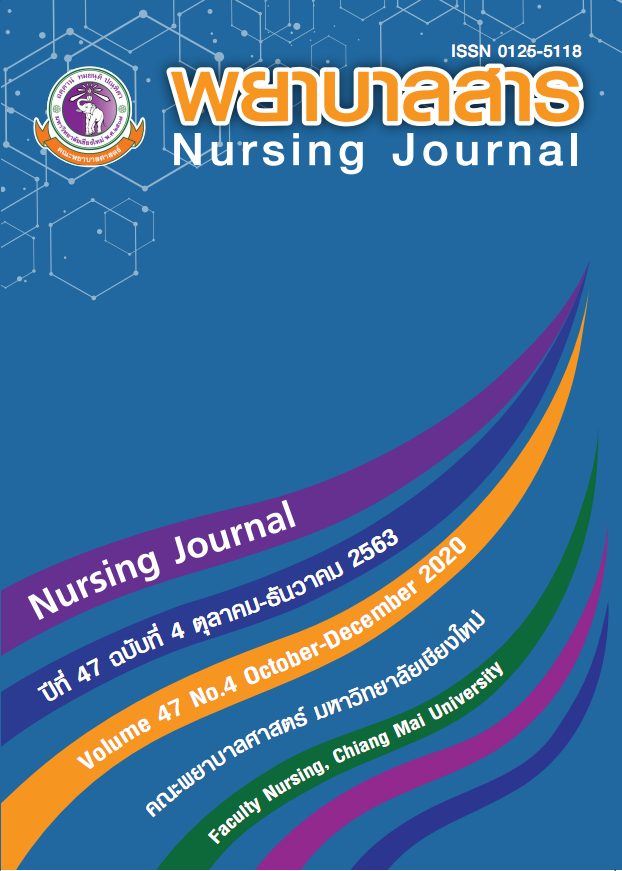Effects of Empowerment Program on Health Behaviors, Body Mass Index and Blood Pressure Levels in Patients with Uncontrolled Hypertension
Keywords:
Empowerment, Health behavior, Body mass index, Blood pressure, Uncontrolled HypertensionAbstract
Abstract
The objective of this quasi-experimental research is to study the effect of an empowerment program in an uncontrollable hypertension patient. The samplings were hypertension patients, divided into experimental group and control group, 30 in each group. Data collected between December 2019 to February 2020. The tool used in this study consisted of 1) The empowerment program in an uncontrollable hypertension patient 2) Health behavior questionnaire. A content validity was 0.92 and the confidence value by using Alpha Cronbach's coefficient was 0.76. Data were analyzed using descriptive statistics, frequency, percentage, mean, and standard deviation. Normality test, Shapiro-Wilk test statistics. Used Nonparametric with Wilcoxon sign rank test and Mann-Whitney u test.
The result of the research shows that uncontrollable hypertension patients after participating in the empowerment program had a higher mean score of health behavior than those receiving regular nursing care and higher than before joining the program statistically significant (p<.001). A BMI of uncontrollable hypertension patient after participating in the empowerment program was lower than before joining the program statistically significant (p <.001) but was not different from a control group. A mean blood pressure levels of uncontrollable hypertension patient after participated the empowerment program had lower blood pressure levels than before participated the empowerment program and lower than the control group statistical significance (p <.001).
The results of this research show the effectiveness of the empowerment program to their awareness of self-worth, learning and understanding of the practice of healthy behavior correctly and able to control blood pressure levels as normal.
Key word: Empowerment, Health behavior, Body mass index, Blood pressure
References
Kijpreeda, B. (2010). Thai General Books at General Books (MainLibrary): Faculty of Social Sciences and Humanities, Mahidol University (4th ed.). Bangkok: Mahidol University.
Chantrakoolchai, N. (2014). The outcomes of empowerment program in uncontrolled hypertension patients (Master’s thesis, Christian University of Thailand).
Cohen, J. (1992). Statistical power analysis of the behavioral sciences. New York: Lawrence Erlbaum Associates.
Gibson, C. H. (1991). A concept analysis of empowerment. Journal of Advanced Nursing, 16(3), 354-361.
Gibson, C. H. (1995). The process of empowerment in mothers of chronically ill children. Journal of Advanced Nursing, 21, 1201–1210.
Hikmat, F., & Appel, L. J. (2014). Effects of the DASH diet on blood pressure in patients with andwithout metabolic syndrome: Results from the DASH trial. Journal of Human Hypertension, 28(3), 170-175. doi.org/10.1038/jhh.2013.52
Jaemtim, N., Yuenyong, S., & Srisodsaluk, P. (2016). Effect of the empowerment program on the prevention of Hypertension disease in the population at risk of hypertension disease of Tombon Chokchram, Umphor Bangplam Suphanburi province. The journal of Boromarajonani college of nusing Nakhonratchasima, 22(1), 65-76.
Miller, J. F. (1992). Coping with Chronic illness: Overcoming Powerlessness (2nd ed.). Philadelphia: F. A. Davis.
Oumtanee, A. (2011). Qualitative research in nursing (2nd ed.). Bangkok: Chulalongkorn University press.
Oumtanee, A. (2007). Developing the potential of the nursing service system, Academic set for empowerment in the nursing service system. Bangkok: Cognitive Disease Hypertension, Alternative Medicine Division, Sukhothai Thammathirat Open University.
Pangjunan, T., & Phanthuwech, N. (2013). World Hypertension League. Retrieved from http://www.worldhypertensionleague.org/Documents/WHD/2013/WHD%202013%20brochure.pdf
Sanghuachang, W., Sangtum, W., & Wongjalearn, W. (2017). The effects of empowerment on perception of empowerment and stroke prevention behaviors in elderly with chronic illness. EAU heritage journal science and technology, 11(3), 159-172.
Silva, R. A., Martins, A. K. L., Castro, N. B., Viana, A. V., Butcher, H. K., & Silva, V. M. (2017). Analysis of the concept of powerlessness in individuals with stroke. Nursing Journal, 35(3), 306-319. doi.org/10.17533/udea.iee.v35n3a07
Soltani, S., Shirani, F., Chitsazi, M., & Salehi-Abargouei, A. (2016). The effect of dietary approaches to stop hypertension (DASH) diet on weight and body composition inadults: a systematic review and meta-analysis of randomized controlled clinical trials. Nursing Journal, 17(5), 442-454. doi:10.1111/obr.12391 PMID: 26990451
Thai Hypertension Society. (2015). Thai Guidelines on The Treatment of Hypertension 2015. Retrieved from http://www.thaihypertension.org/files/GL%20HT%202015.pdf.
Thai Hypertension Society. (2019). Thai guidelines on the treatment of hypertension 2019. Retrieved from http://www.thaiheart.org/images/column_1563846428/Thai%20HT% 20Guideline%202019.pdf
World Health Organization. (2013). A global brief on hypertension Silent killer, global public health crisis. Retrieved from http://www.who.int/cardiovascular_diseases/ publications/global_brief_hypertension/en/
Downloads
Published
How to Cite
Issue
Section
License
บทความที่ได้รับการตีพิมพ์เป็นลิขสิทธิ์ของวารสารพยาบาลสาร
ข้อความที่ปรากฏในบทความแต่ละเรื่องในวารสารวิชาการเล่มนี้เป็นความคิดเห็นส่วนตัวของผู้เขียนแต่ละท่านไม่เกี่ยวข้องกับมหาวิทยาลัยเชียงใหม่ และคณาจารย์ท่านอื่นๆในมหาวิทยาลัยฯ แต่อย่างใด ความรับผิดชอบองค์ประกอบทั้งหมดของบทความแต่ละเรื่องเป็นของผู้เขียนแต่ละท่าน หากมีความผิดพลาดใด ๆ ผู้เขียนแต่ละท่านจะรับผิดชอบบทความของตนเองแต่ผู้เดียว






